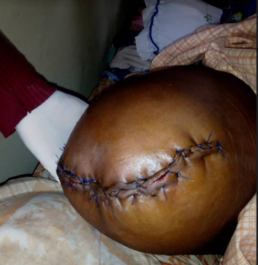
mission 21 | The Protestant University of Central Africa (PUCA), one of three regular partner organisations of Mission 21 in Cameroon, is reacting to the Anglophone crisis in Cameroon by using an interdisciplinary approach: Theologicans and medical doctors are helping internally displaced people (IDPs) in Yaoundé, the capital city of Cameroon, in a joint approach. Since 2016, civil war is ravaging the Anglophone regions in the West of Cameroon. So far, 3000 deaths, 50-60’000 refugees to Nigeria, and up to 700’000 IDPs are victims of the conflict along the former colonial borders. The Anglophone minority is fighting against marginalization from the Francophone majority in the country. The normal population is suffering in between government troops and separatist groups, both committing atrocities. The PUCA reacted in a programme offering medical and psychosocial help to refugees in Yaoundé, who are often deeply traumatized by what they had to go through.
The regular project partner PUCA launched an interdisciplinary programme between the theological and the medical faculty to offer help for IDPs in Yaoundé. Severely injured victims of the crisis were offered medical help in Yaoundé through surgery and medical treatment. At the same time, trained counsellors from the theological faculty helped the victims of violence to deal with the psychosocial aspect of the wounds and the effects on their lives.
One example is Ms. J.S., 43 years old, and her husband Mr. C.K., 58 years old: While fleeing from violence in the NW province, the wife fell 18 months ago. Her right leg was severely injured and, because of the lack of adequate treatment, developed a gangrene and eventually became necrotic. She was carried by her husband while fleeing their village that was burnt down, including their house. The couple was displaced to Yaoundé and came for consultations to the PUCA programme. Surgery was performed twice and the badly infected and necrotic leg had to be amputated on the 19th September 2019.
Her husband suffered from back pain because he had to carry his wife for considerable distances. He was treated with pain killers while his wife was in hospital. Because of the loss of their home, especially the husband suffered from a post-traumatic-stress-disorder syndrome. He received counselling sessions with follow-ups in the trauma-centre at PUCA.
The amputation of the leg was successful despite the necessary blood transfusions during surgery. No further complications were observed. Kinesiotherapy has started right after the operation and an artificial leg can be done after three months’ time.
………………..
mission 21 is a member of the Network Medicus Mundi Switzerland
Contribution to the Annual Report 2019 of the MMI Network
